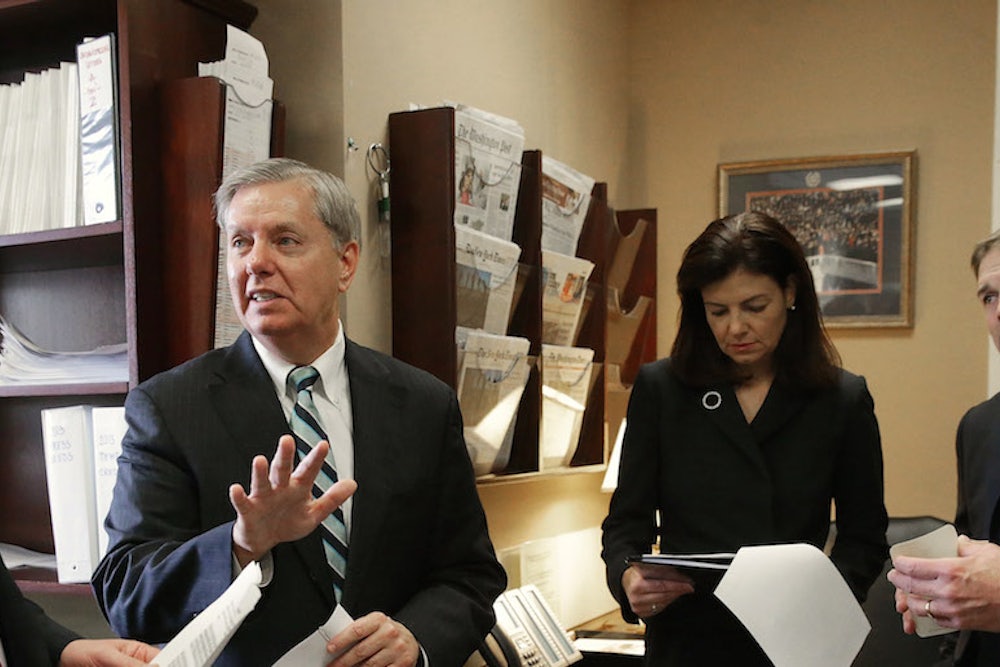House Republicans investigating Benghazi like to say the word "coverup" a lot, when invariably what they mean by "coverup" is that they believe administration officials and President Obama whitewashed events for a few days after the attack in Libya to minimize political damage to Obama's campaign.
This is a highly contestable interpretation of events, undergirded by deeply flawed logic—how is intentionally downplaying a terrorist attack, then acknowledging it, then retroactively making excuses for the original whitewash more politically advantageous than coming right out and saying it? But at least it's plausible. What it isn't, though, is a "coverup."
But they use that term because the right in America is consumed by the belief that Obama really tried to coverup the attack—perhaps hoping to lump it in with the other, less deadly uprisings on September 11, 2012—and that four Americans died as a result.
That would be a big scandal. It's just not what happened. And if Republicans had made a concerted effort to disabuse the right of its more paranoid notions, it's hard to imagine this tremendous appetite to create a special committee to investigate the propriety of administration talking points. Or its turf war with Congress.
But they didn't do that. And I think two different Benghazi news features last week help shed light on why, by helping to clarify the differences between conspiracy and reality, and which elements of the right believe what.
There's the below MSNBC segment in which Chris Hayes does an excellent job distinguishing between "the real Benghazi" and "hashtag Benghazi," and this Vox article, which attempts to map the paranoid rendering of Benghazi on to an academic theory of the origins and durability of conspiracy theories.
The Vox article makes it easy to understand how "hashtag Benghazi" came to be what it is, without much political interference. But it's also much, much too credulous of the idea that the Republican political professionals making unsupportable claims of a "coverup" have been taken in, and aren't simply milking their own base's paranoia.
That an anonymous House GOP operative claimed John Boehner is "obsessed" with Benghazi and "brings it up all the time" doesn't make it so. And the claim itself doesn't even really support the conclusion that Boehner is a denizen of "hashtag Benghazi." Boehner is the House Speaker and a Republican. He has territorial and political reasons for being preoccupied with Benghazi that have nothing to do with a deadly conspiracy.
By contrast, the evidence that Republican leaders and party operatives know the score, and fully understand what they're doing, is sitting everywhere in plain sight. Just spend a few minutes perusing the Twitter feeds of the party's political committees, allied electioneering organizations, and their spokespeople. These aren't fact finders. They're supposed to turn out voters and win elections.
And they aren't even particularly shy about explaining the game:
Republican political officials say Benghazi is a subject of intense interest for the party's conservative base of support, who are likely voters in November. "We're going to use every opportunity we can to highlight it," said Republican National Committee spokeswoman Kirsten Kukowski. Republicans also see the chance to chip away at the image of Hillary Clinton, the potential 2016 Democratic presidential candidate who was secretary of state when Benghazi occurred.
The National Republican Congressional Committee is using the deluge of Benghazi news to raise money. And Republican leaders themselves are treating it as a red meat issue for their base, and not as a "hashtag Benghazi"-sized scandal.
Opening statements over at house GOP leadership presser. No mention of Benghazi. They clearly don't want to put this front and center.
— Jake Sherman (@JakeSherman) May 7, 2014None of this exactly disproves the suggestion that they believe their own b.s. But it's really inconsistent with that idea. If John Boehner and his leadership team genuinely believe the things Benghazi conspiracy theorists believe, then they're treating the issue in an incredibly strange way.
